Business Law Take-Home Exam Solution - UK Business Law Analysis
VerifiedAdded on 2023/06/10
|8
|2452
|280
Homework Assignment
AI Summary
This document offers a detailed solution to a Business Law take-home exam, focusing on the UK legal system. It begins by defining the rule of law and classifying UK laws into civil and criminal categories, outlining their characteristics and providing examples. The solution then explores the three distinct legal systems within the UK: England and Wales, Northern Ireland, and Scotland. It delves into the hierarchy of law sources in the English legal system, differentiating between primary and secondary sources, including legislation, case law, parliamentary conventions, general customs, and books of authority, alongside their features. The assignment further discusses the impact of these laws on multilingual organizations. Finally, the solution addresses employment law, emphasizing its role in protecting employees and its influence on commercial organizations, with a focus on the Health and Safety at Work Act 1974 and the Equal Pay Act 1970, highlighting their importance in fostering a safe and equitable work environment.
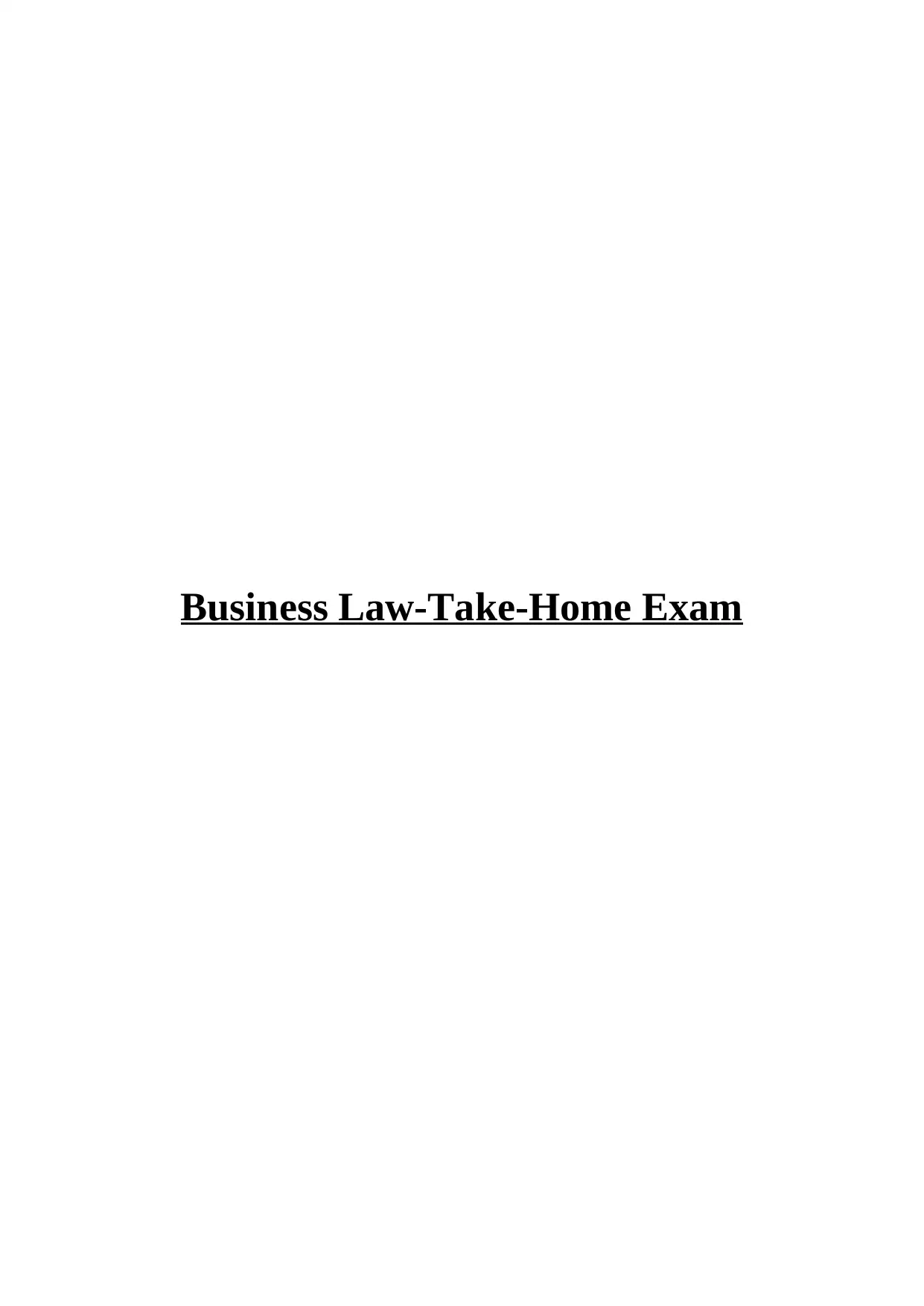
Business Law-Take-Home Exam
Paraphrase This Document
Need a fresh take? Get an instant paraphrase of this document with our AI Paraphraser
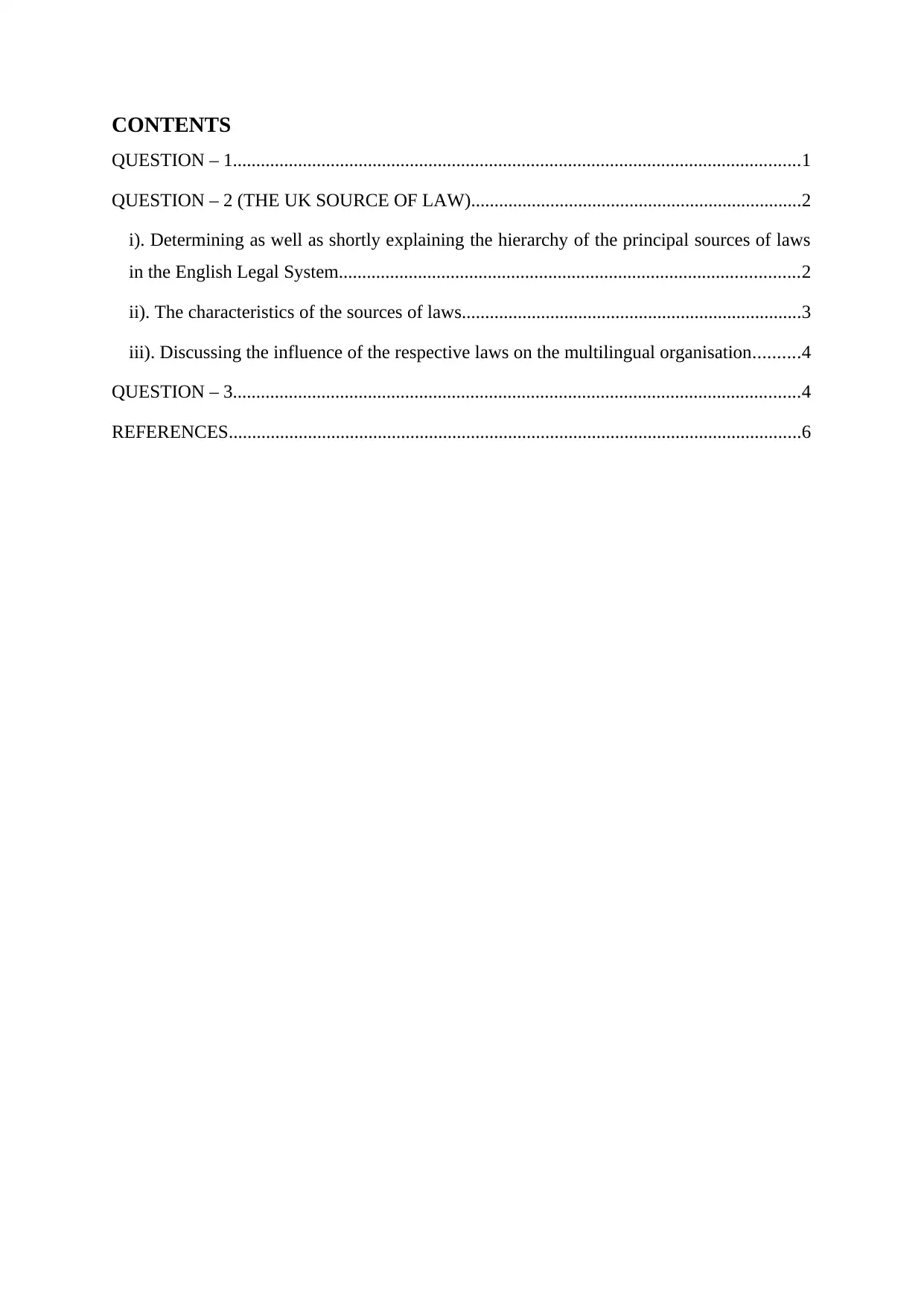
CONTENTS
QUESTION – 1..........................................................................................................................1
QUESTION – 2 (THE UK SOURCE OF LAW).......................................................................2
i). Determining as well as shortly explaining the hierarchy of the principal sources of laws
in the English Legal System...................................................................................................2
ii). The characteristics of the sources of laws.........................................................................3
iii). Discussing the influence of the respective laws on the multilingual organisation..........4
QUESTION – 3..........................................................................................................................4
REFERENCES...........................................................................................................................6
QUESTION – 1..........................................................................................................................1
QUESTION – 2 (THE UK SOURCE OF LAW).......................................................................2
i). Determining as well as shortly explaining the hierarchy of the principal sources of laws
in the English Legal System...................................................................................................2
ii). The characteristics of the sources of laws.........................................................................3
iii). Discussing the influence of the respective laws on the multilingual organisation..........4
QUESTION – 3..........................................................................................................................4
REFERENCES...........................................................................................................................6
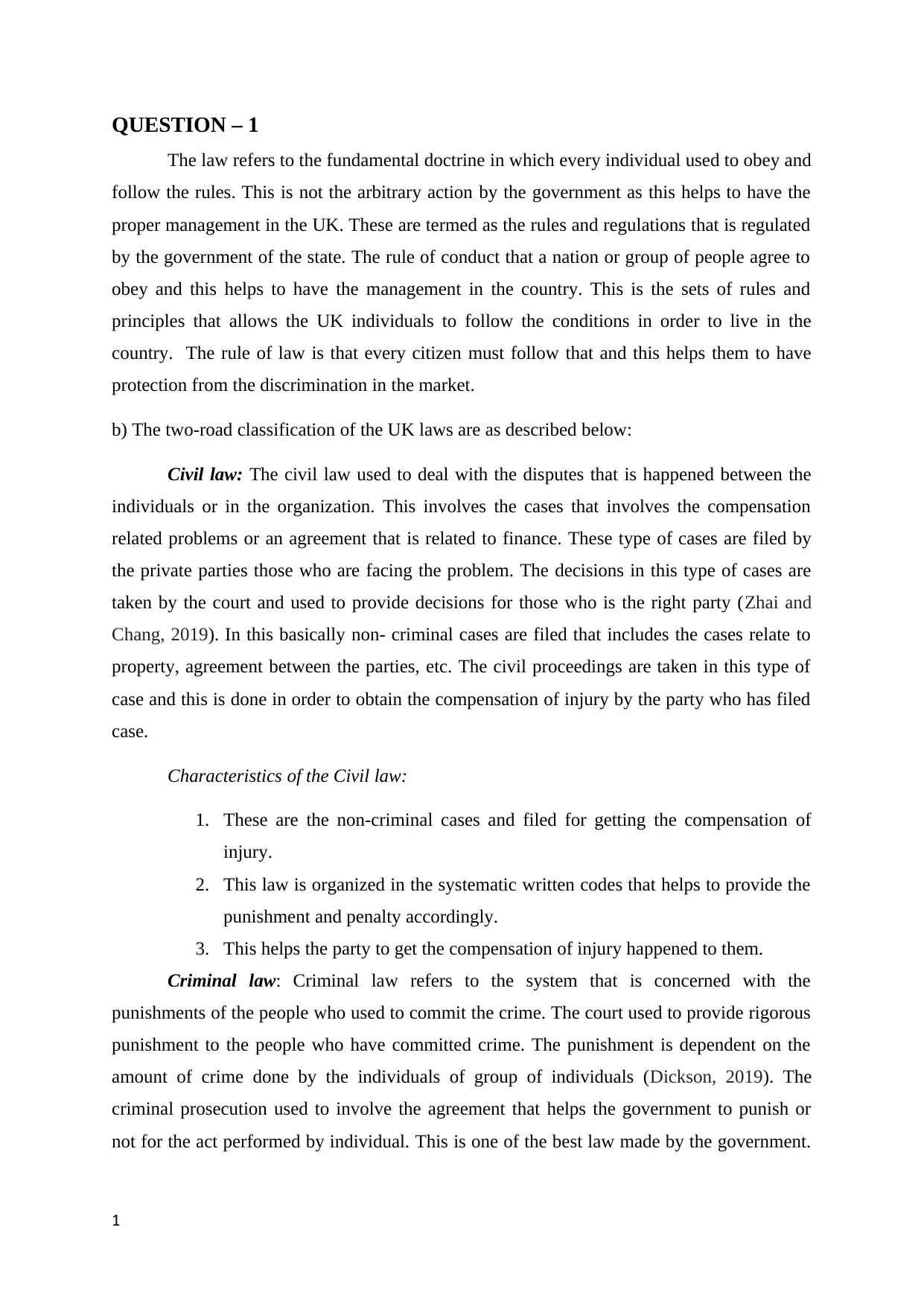
QUESTION – 1
The law refers to the fundamental doctrine in which every individual used to obey and
follow the rules. This is not the arbitrary action by the government as this helps to have the
proper management in the UK. These are termed as the rules and regulations that is regulated
by the government of the state. The rule of conduct that a nation or group of people agree to
obey and this helps to have the management in the country. This is the sets of rules and
principles that allows the UK individuals to follow the conditions in order to live in the
country. The rule of law is that every citizen must follow that and this helps them to have
protection from the discrimination in the market.
b) The two-road classification of the UK laws are as described below:
Civil law: The civil law used to deal with the disputes that is happened between the
individuals or in the organization. This involves the cases that involves the compensation
related problems or an agreement that is related to finance. These type of cases are filed by
the private parties those who are facing the problem. The decisions in this type of cases are
taken by the court and used to provide decisions for those who is the right party (Zhai and
Chang, 2019). In this basically non- criminal cases are filed that includes the cases relate to
property, agreement between the parties, etc. The civil proceedings are taken in this type of
case and this is done in order to obtain the compensation of injury by the party who has filed
case.
Characteristics of the Civil law:
1. These are the non-criminal cases and filed for getting the compensation of
injury.
2. This law is organized in the systematic written codes that helps to provide the
punishment and penalty accordingly.
3. This helps the party to get the compensation of injury happened to them.
Criminal law: Criminal law refers to the system that is concerned with the
punishments of the people who used to commit the crime. The court used to provide rigorous
punishment to the people who have committed crime. The punishment is dependent on the
amount of crime done by the individuals of group of individuals (Dickson, 2019). The
criminal prosecution used to involve the agreement that helps the government to punish or
not for the act performed by individual. This is one of the best law made by the government.
1
The law refers to the fundamental doctrine in which every individual used to obey and
follow the rules. This is not the arbitrary action by the government as this helps to have the
proper management in the UK. These are termed as the rules and regulations that is regulated
by the government of the state. The rule of conduct that a nation or group of people agree to
obey and this helps to have the management in the country. This is the sets of rules and
principles that allows the UK individuals to follow the conditions in order to live in the
country. The rule of law is that every citizen must follow that and this helps them to have
protection from the discrimination in the market.
b) The two-road classification of the UK laws are as described below:
Civil law: The civil law used to deal with the disputes that is happened between the
individuals or in the organization. This involves the cases that involves the compensation
related problems or an agreement that is related to finance. These type of cases are filed by
the private parties those who are facing the problem. The decisions in this type of cases are
taken by the court and used to provide decisions for those who is the right party (Zhai and
Chang, 2019). In this basically non- criminal cases are filed that includes the cases relate to
property, agreement between the parties, etc. The civil proceedings are taken in this type of
case and this is done in order to obtain the compensation of injury by the party who has filed
case.
Characteristics of the Civil law:
1. These are the non-criminal cases and filed for getting the compensation of
injury.
2. This law is organized in the systematic written codes that helps to provide the
punishment and penalty accordingly.
3. This helps the party to get the compensation of injury happened to them.
Criminal law: Criminal law refers to the system that is concerned with the
punishments of the people who used to commit the crime. The court used to provide rigorous
punishment to the people who have committed crime. The punishment is dependent on the
amount of crime done by the individuals of group of individuals (Dickson, 2019). The
criminal prosecution used to involve the agreement that helps the government to punish or
not for the act performed by individual. This is one of the best law made by the government.
1
⊘ This is a preview!⊘
Do you want full access?
Subscribe today to unlock all pages.

Trusted by 1+ million students worldwide
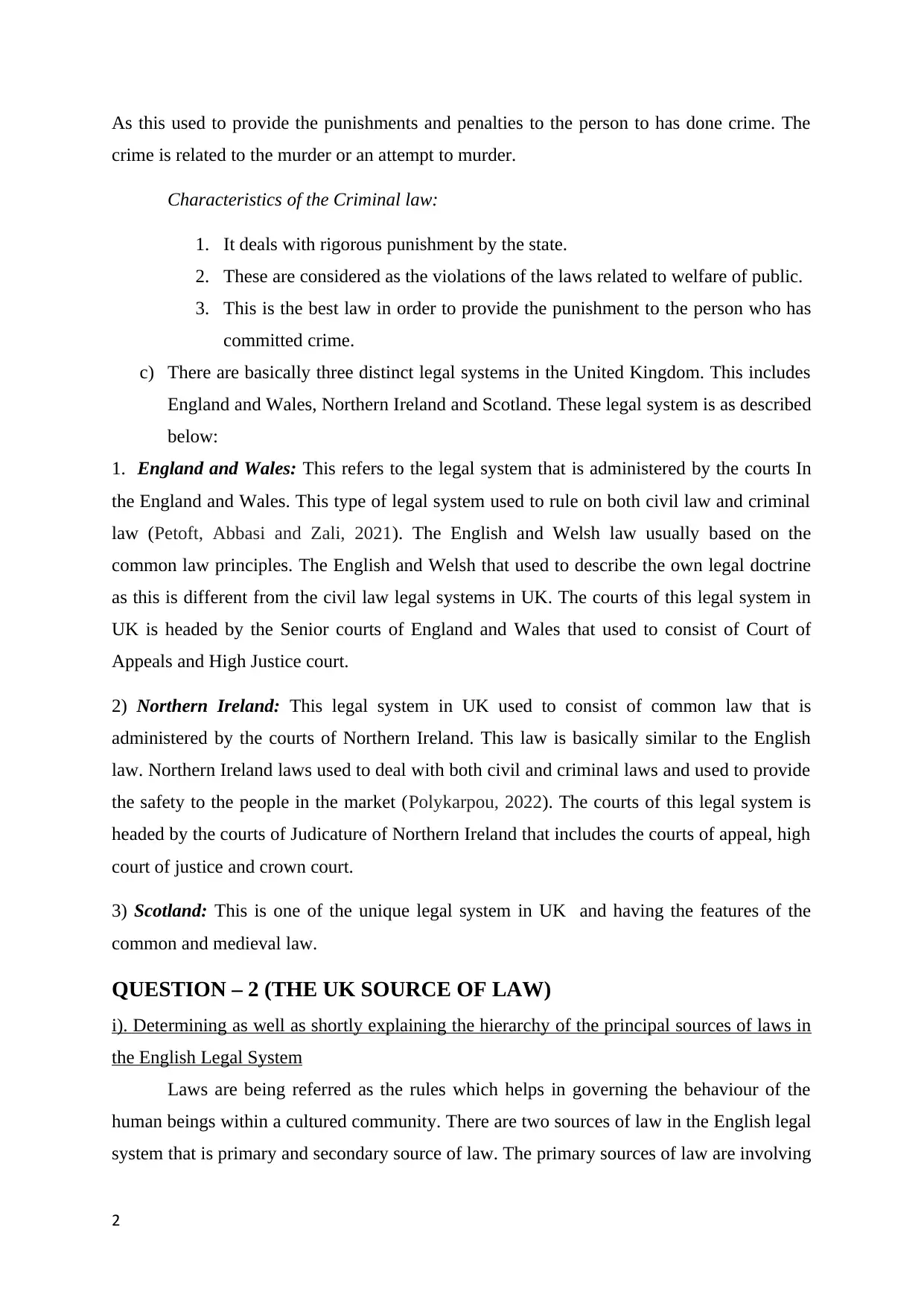
As this used to provide the punishments and penalties to the person to has done crime. The
crime is related to the murder or an attempt to murder.
Characteristics of the Criminal law:
1. It deals with rigorous punishment by the state.
2. These are considered as the violations of the laws related to welfare of public.
3. This is the best law in order to provide the punishment to the person who has
committed crime.
c) There are basically three distinct legal systems in the United Kingdom. This includes
England and Wales, Northern Ireland and Scotland. These legal system is as described
below:
1. England and Wales: This refers to the legal system that is administered by the courts In
the England and Wales. This type of legal system used to rule on both civil law and criminal
law (Petoft, Abbasi and Zali, 2021). The English and Welsh law usually based on the
common law principles. The English and Welsh that used to describe the own legal doctrine
as this is different from the civil law legal systems in UK. The courts of this legal system in
UK is headed by the Senior courts of England and Wales that used to consist of Court of
Appeals and High Justice court.
2) Northern Ireland: This legal system in UK used to consist of common law that is
administered by the courts of Northern Ireland. This law is basically similar to the English
law. Northern Ireland laws used to deal with both civil and criminal laws and used to provide
the safety to the people in the market (Polykarpou, 2022). The courts of this legal system is
headed by the courts of Judicature of Northern Ireland that includes the courts of appeal, high
court of justice and crown court.
3) Scotland: This is one of the unique legal system in UK and having the features of the
common and medieval law.
QUESTION – 2 (THE UK SOURCE OF LAW)
i). Determining as well as shortly explaining the hierarchy of the principal sources of laws in
the English Legal System
Laws are being referred as the rules which helps in governing the behaviour of the
human beings within a cultured community. There are two sources of law in the English legal
system that is primary and secondary source of law. The primary sources of law are involving
2
crime is related to the murder or an attempt to murder.
Characteristics of the Criminal law:
1. It deals with rigorous punishment by the state.
2. These are considered as the violations of the laws related to welfare of public.
3. This is the best law in order to provide the punishment to the person who has
committed crime.
c) There are basically three distinct legal systems in the United Kingdom. This includes
England and Wales, Northern Ireland and Scotland. These legal system is as described
below:
1. England and Wales: This refers to the legal system that is administered by the courts In
the England and Wales. This type of legal system used to rule on both civil law and criminal
law (Petoft, Abbasi and Zali, 2021). The English and Welsh law usually based on the
common law principles. The English and Welsh that used to describe the own legal doctrine
as this is different from the civil law legal systems in UK. The courts of this legal system in
UK is headed by the Senior courts of England and Wales that used to consist of Court of
Appeals and High Justice court.
2) Northern Ireland: This legal system in UK used to consist of common law that is
administered by the courts of Northern Ireland. This law is basically similar to the English
law. Northern Ireland laws used to deal with both civil and criminal laws and used to provide
the safety to the people in the market (Polykarpou, 2022). The courts of this legal system is
headed by the courts of Judicature of Northern Ireland that includes the courts of appeal, high
court of justice and crown court.
3) Scotland: This is one of the unique legal system in UK and having the features of the
common and medieval law.
QUESTION – 2 (THE UK SOURCE OF LAW)
i). Determining as well as shortly explaining the hierarchy of the principal sources of laws in
the English Legal System
Laws are being referred as the rules which helps in governing the behaviour of the
human beings within a cultured community. There are two sources of law in the English legal
system that is primary and secondary source of law. The primary sources of law are involving
2
Paraphrase This Document
Need a fresh take? Get an instant paraphrase of this document with our AI Paraphraser
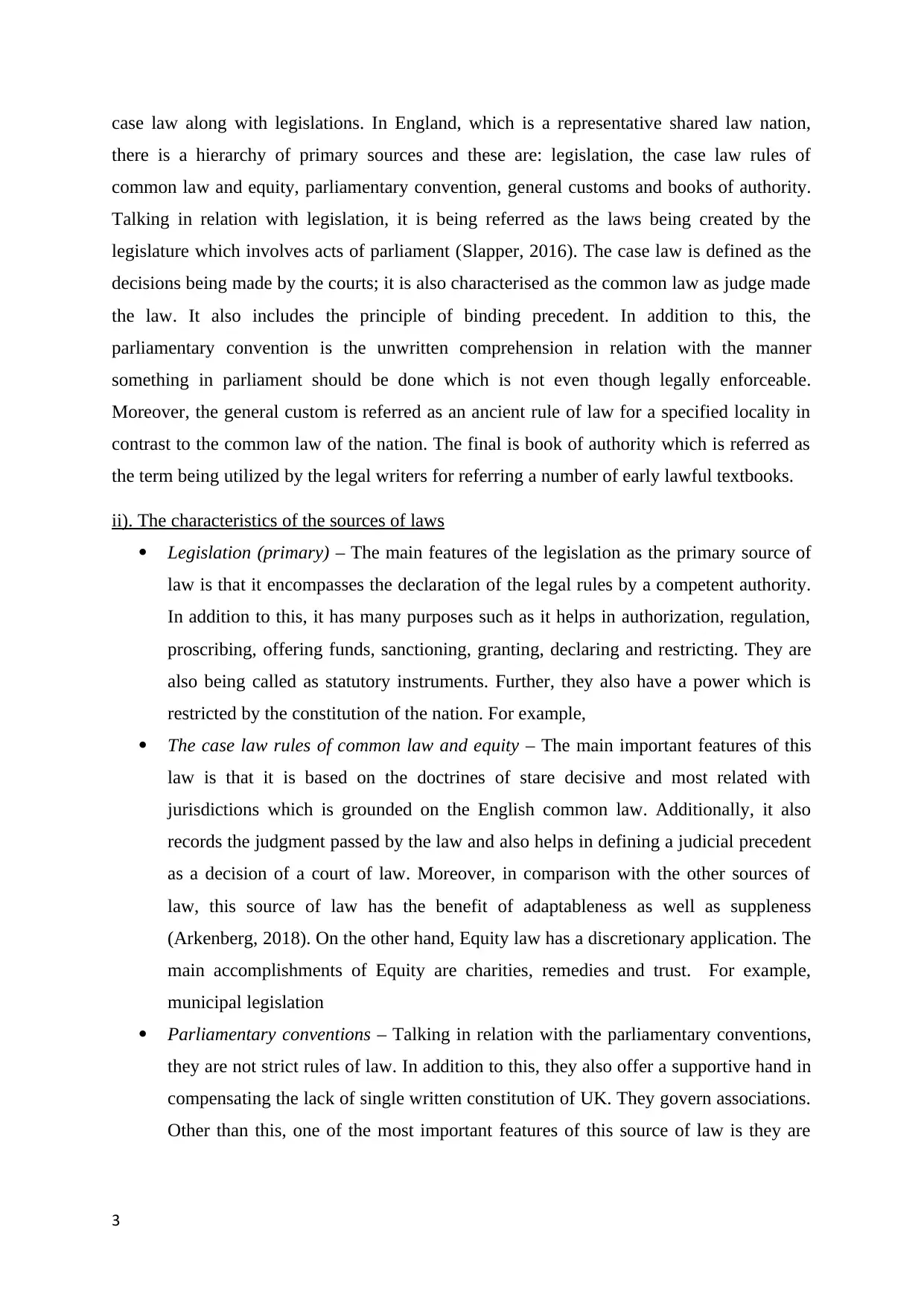
case law along with legislations. In England, which is a representative shared law nation,
there is a hierarchy of primary sources and these are: legislation, the case law rules of
common law and equity, parliamentary convention, general customs and books of authority.
Talking in relation with legislation, it is being referred as the laws being created by the
legislature which involves acts of parliament (Slapper, 2016). The case law is defined as the
decisions being made by the courts; it is also characterised as the common law as judge made
the law. It also includes the principle of binding precedent. In addition to this, the
parliamentary convention is the unwritten comprehension in relation with the manner
something in parliament should be done which is not even though legally enforceable.
Moreover, the general custom is referred as an ancient rule of law for a specified locality in
contrast to the common law of the nation. The final is book of authority which is referred as
the term being utilized by the legal writers for referring a number of early lawful textbooks.
ii). The characteristics of the sources of laws
Legislation (primary) – The main features of the legislation as the primary source of
law is that it encompasses the declaration of the legal rules by a competent authority.
In addition to this, it has many purposes such as it helps in authorization, regulation,
proscribing, offering funds, sanctioning, granting, declaring and restricting. They are
also being called as statutory instruments. Further, they also have a power which is
restricted by the constitution of the nation. For example,
The case law rules of common law and equity – The main important features of this
law is that it is based on the doctrines of stare decisive and most related with
jurisdictions which is grounded on the English common law. Additionally, it also
records the judgment passed by the law and also helps in defining a judicial precedent
as a decision of a court of law. Moreover, in comparison with the other sources of
law, this source of law has the benefit of adaptableness as well as suppleness
(Arkenberg, 2018). On the other hand, Equity law has a discretionary application. The
main accomplishments of Equity are charities, remedies and trust. For example,
municipal legislation
Parliamentary conventions – Talking in relation with the parliamentary conventions,
they are not strict rules of law. In addition to this, they also offer a supportive hand in
compensating the lack of single written constitution of UK. They govern associations.
Other than this, one of the most important features of this source of law is they are
3
there is a hierarchy of primary sources and these are: legislation, the case law rules of
common law and equity, parliamentary convention, general customs and books of authority.
Talking in relation with legislation, it is being referred as the laws being created by the
legislature which involves acts of parliament (Slapper, 2016). The case law is defined as the
decisions being made by the courts; it is also characterised as the common law as judge made
the law. It also includes the principle of binding precedent. In addition to this, the
parliamentary convention is the unwritten comprehension in relation with the manner
something in parliament should be done which is not even though legally enforceable.
Moreover, the general custom is referred as an ancient rule of law for a specified locality in
contrast to the common law of the nation. The final is book of authority which is referred as
the term being utilized by the legal writers for referring a number of early lawful textbooks.
ii). The characteristics of the sources of laws
Legislation (primary) – The main features of the legislation as the primary source of
law is that it encompasses the declaration of the legal rules by a competent authority.
In addition to this, it has many purposes such as it helps in authorization, regulation,
proscribing, offering funds, sanctioning, granting, declaring and restricting. They are
also being called as statutory instruments. Further, they also have a power which is
restricted by the constitution of the nation. For example,
The case law rules of common law and equity – The main important features of this
law is that it is based on the doctrines of stare decisive and most related with
jurisdictions which is grounded on the English common law. Additionally, it also
records the judgment passed by the law and also helps in defining a judicial precedent
as a decision of a court of law. Moreover, in comparison with the other sources of
law, this source of law has the benefit of adaptableness as well as suppleness
(Arkenberg, 2018). On the other hand, Equity law has a discretionary application. The
main accomplishments of Equity are charities, remedies and trust. For example,
municipal legislation
Parliamentary conventions – Talking in relation with the parliamentary conventions,
they are not strict rules of law. In addition to this, they also offer a supportive hand in
compensating the lack of single written constitution of UK. They govern associations.
Other than this, one of the most important features of this source of law is they are
3
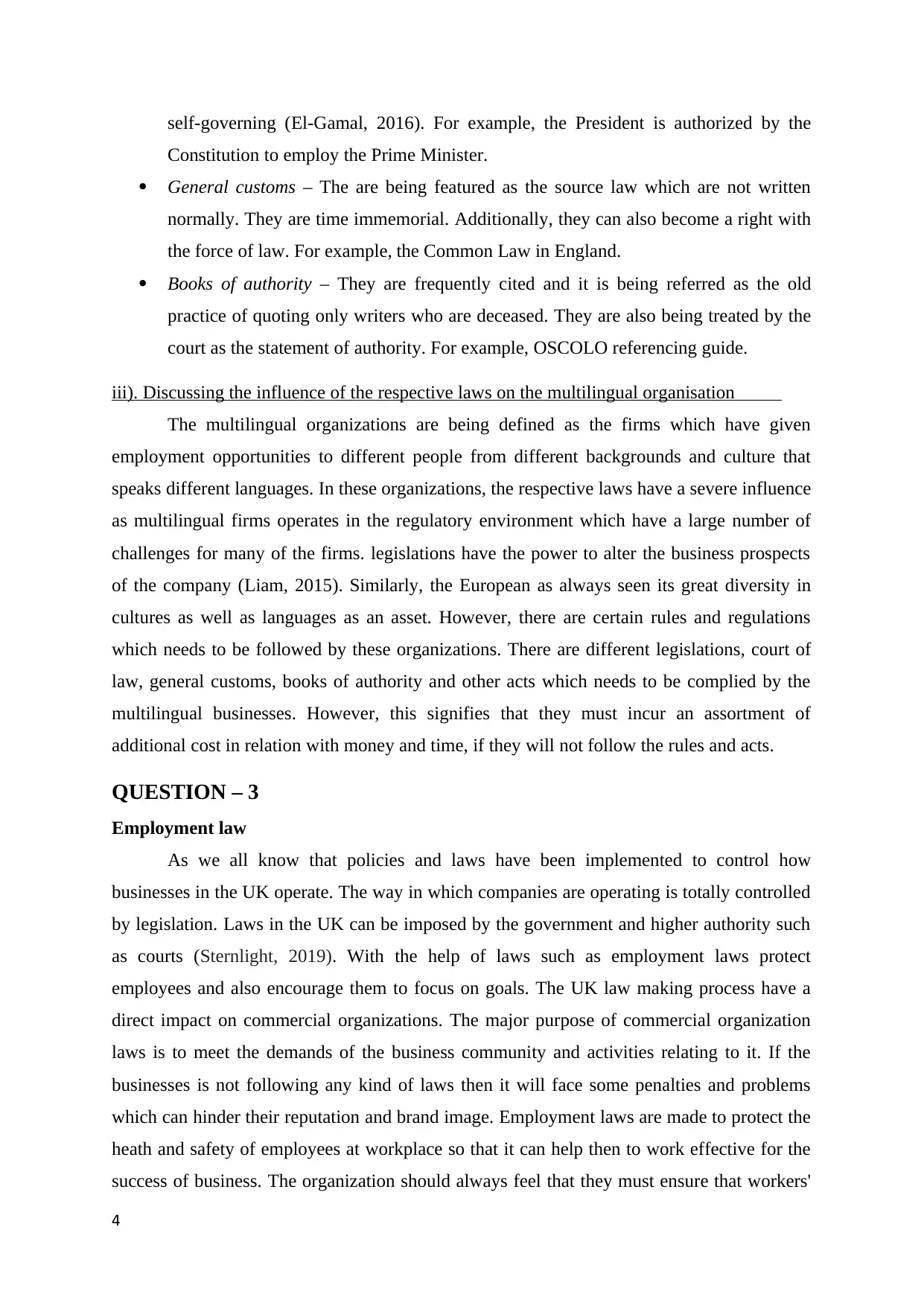
self-governing (El-Gamal, 2016). For example, the President is authorized by the
Constitution to employ the Prime Minister.
General customs – The are being featured as the source law which are not written
normally. They are time immemorial. Additionally, they can also become a right with
the force of law. For example, the Common Law in England.
Books of authority – They are frequently cited and it is being referred as the old
practice of quoting only writers who are deceased. They are also being treated by the
court as the statement of authority. For example, OSCOLO referencing guide.
iii). Discussing the influence of the respective laws on the multilingual organisation
The multilingual organizations are being defined as the firms which have given
employment opportunities to different people from different backgrounds and culture that
speaks different languages. In these organizations, the respective laws have a severe influence
as multilingual firms operates in the regulatory environment which have a large number of
challenges for many of the firms. legislations have the power to alter the business prospects
of the company (Liam, 2015). Similarly, the European as always seen its great diversity in
cultures as well as languages as an asset. However, there are certain rules and regulations
which needs to be followed by these organizations. There are different legislations, court of
law, general customs, books of authority and other acts which needs to be complied by the
multilingual businesses. However, this signifies that they must incur an assortment of
additional cost in relation with money and time, if they will not follow the rules and acts.
QUESTION – 3
Employment law
As we all know that policies and laws have been implemented to control how
businesses in the UK operate. The way in which companies are operating is totally controlled
by legislation. Laws in the UK can be imposed by the government and higher authority such
as courts (Sternlight, 2019). With the help of laws such as employment laws protect
employees and also encourage them to focus on goals. The UK law making process have a
direct impact on commercial organizations. The major purpose of commercial organization
laws is to meet the demands of the business community and activities relating to it. If the
businesses is not following any kind of laws then it will face some penalties and problems
which can hinder their reputation and brand image. Employment laws are made to protect the
heath and safety of employees at workplace so that it can help then to work effective for the
success of business. The organization should always feel that they must ensure that workers'
4
Constitution to employ the Prime Minister.
General customs – The are being featured as the source law which are not written
normally. They are time immemorial. Additionally, they can also become a right with
the force of law. For example, the Common Law in England.
Books of authority – They are frequently cited and it is being referred as the old
practice of quoting only writers who are deceased. They are also being treated by the
court as the statement of authority. For example, OSCOLO referencing guide.
iii). Discussing the influence of the respective laws on the multilingual organisation
The multilingual organizations are being defined as the firms which have given
employment opportunities to different people from different backgrounds and culture that
speaks different languages. In these organizations, the respective laws have a severe influence
as multilingual firms operates in the regulatory environment which have a large number of
challenges for many of the firms. legislations have the power to alter the business prospects
of the company (Liam, 2015). Similarly, the European as always seen its great diversity in
cultures as well as languages as an asset. However, there are certain rules and regulations
which needs to be followed by these organizations. There are different legislations, court of
law, general customs, books of authority and other acts which needs to be complied by the
multilingual businesses. However, this signifies that they must incur an assortment of
additional cost in relation with money and time, if they will not follow the rules and acts.
QUESTION – 3
Employment law
As we all know that policies and laws have been implemented to control how
businesses in the UK operate. The way in which companies are operating is totally controlled
by legislation. Laws in the UK can be imposed by the government and higher authority such
as courts (Sternlight, 2019). With the help of laws such as employment laws protect
employees and also encourage them to focus on goals. The UK law making process have a
direct impact on commercial organizations. The major purpose of commercial organization
laws is to meet the demands of the business community and activities relating to it. If the
businesses is not following any kind of laws then it will face some penalties and problems
which can hinder their reputation and brand image. Employment laws are made to protect the
heath and safety of employees at workplace so that it can help then to work effective for the
success of business. The organization should always feel that they must ensure that workers'
4
⊘ This is a preview!⊘
Do you want full access?
Subscribe today to unlock all pages.

Trusted by 1+ million students worldwide
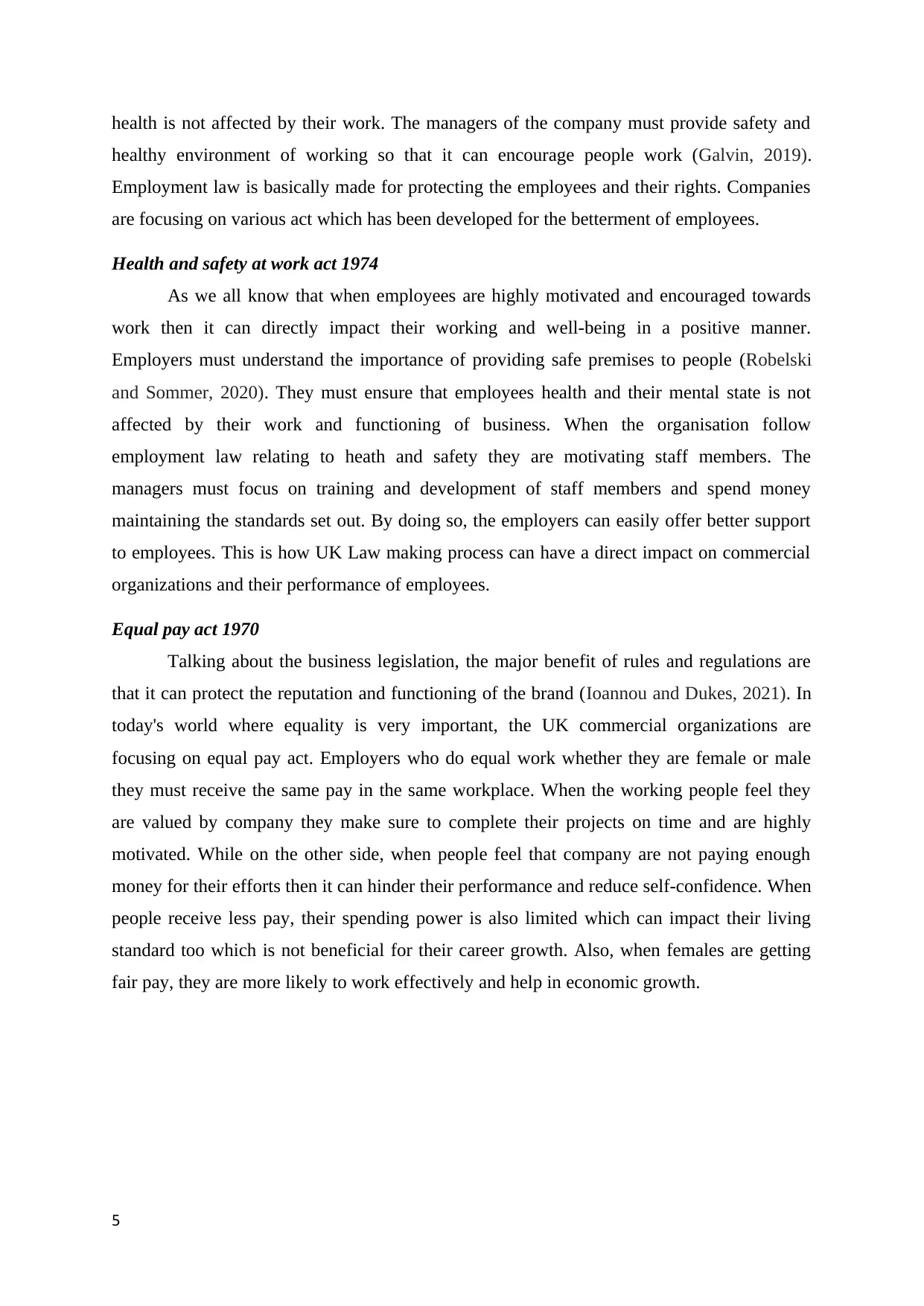
health is not affected by their work. The managers of the company must provide safety and
healthy environment of working so that it can encourage people work (Galvin, 2019).
Employment law is basically made for protecting the employees and their rights. Companies
are focusing on various act which has been developed for the betterment of employees.
Health and safety at work act 1974
As we all know that when employees are highly motivated and encouraged towards
work then it can directly impact their working and well-being in a positive manner.
Employers must understand the importance of providing safe premises to people (Robelski
and Sommer, 2020). They must ensure that employees health and their mental state is not
affected by their work and functioning of business. When the organisation follow
employment law relating to heath and safety they are motivating staff members. The
managers must focus on training and development of staff members and spend money
maintaining the standards set out. By doing so, the employers can easily offer better support
to employees. This is how UK Law making process can have a direct impact on commercial
organizations and their performance of employees.
Equal pay act 1970
Talking about the business legislation, the major benefit of rules and regulations are
that it can protect the reputation and functioning of the brand (Ioannou and Dukes, 2021). In
today's world where equality is very important, the UK commercial organizations are
focusing on equal pay act. Employers who do equal work whether they are female or male
they must receive the same pay in the same workplace. When the working people feel they
are valued by company they make sure to complete their projects on time and are highly
motivated. While on the other side, when people feel that company are not paying enough
money for their efforts then it can hinder their performance and reduce self-confidence. When
people receive less pay, their spending power is also limited which can impact their living
standard too which is not beneficial for their career growth. Also, when females are getting
fair pay, they are more likely to work effectively and help in economic growth.
5
healthy environment of working so that it can encourage people work (Galvin, 2019).
Employment law is basically made for protecting the employees and their rights. Companies
are focusing on various act which has been developed for the betterment of employees.
Health and safety at work act 1974
As we all know that when employees are highly motivated and encouraged towards
work then it can directly impact their working and well-being in a positive manner.
Employers must understand the importance of providing safe premises to people (Robelski
and Sommer, 2020). They must ensure that employees health and their mental state is not
affected by their work and functioning of business. When the organisation follow
employment law relating to heath and safety they are motivating staff members. The
managers must focus on training and development of staff members and spend money
maintaining the standards set out. By doing so, the employers can easily offer better support
to employees. This is how UK Law making process can have a direct impact on commercial
organizations and their performance of employees.
Equal pay act 1970
Talking about the business legislation, the major benefit of rules and regulations are
that it can protect the reputation and functioning of the brand (Ioannou and Dukes, 2021). In
today's world where equality is very important, the UK commercial organizations are
focusing on equal pay act. Employers who do equal work whether they are female or male
they must receive the same pay in the same workplace. When the working people feel they
are valued by company they make sure to complete their projects on time and are highly
motivated. While on the other side, when people feel that company are not paying enough
money for their efforts then it can hinder their performance and reduce self-confidence. When
people receive less pay, their spending power is also limited which can impact their living
standard too which is not beneficial for their career growth. Also, when females are getting
fair pay, they are more likely to work effectively and help in economic growth.
5
Paraphrase This Document
Need a fresh take? Get an instant paraphrase of this document with our AI Paraphraser
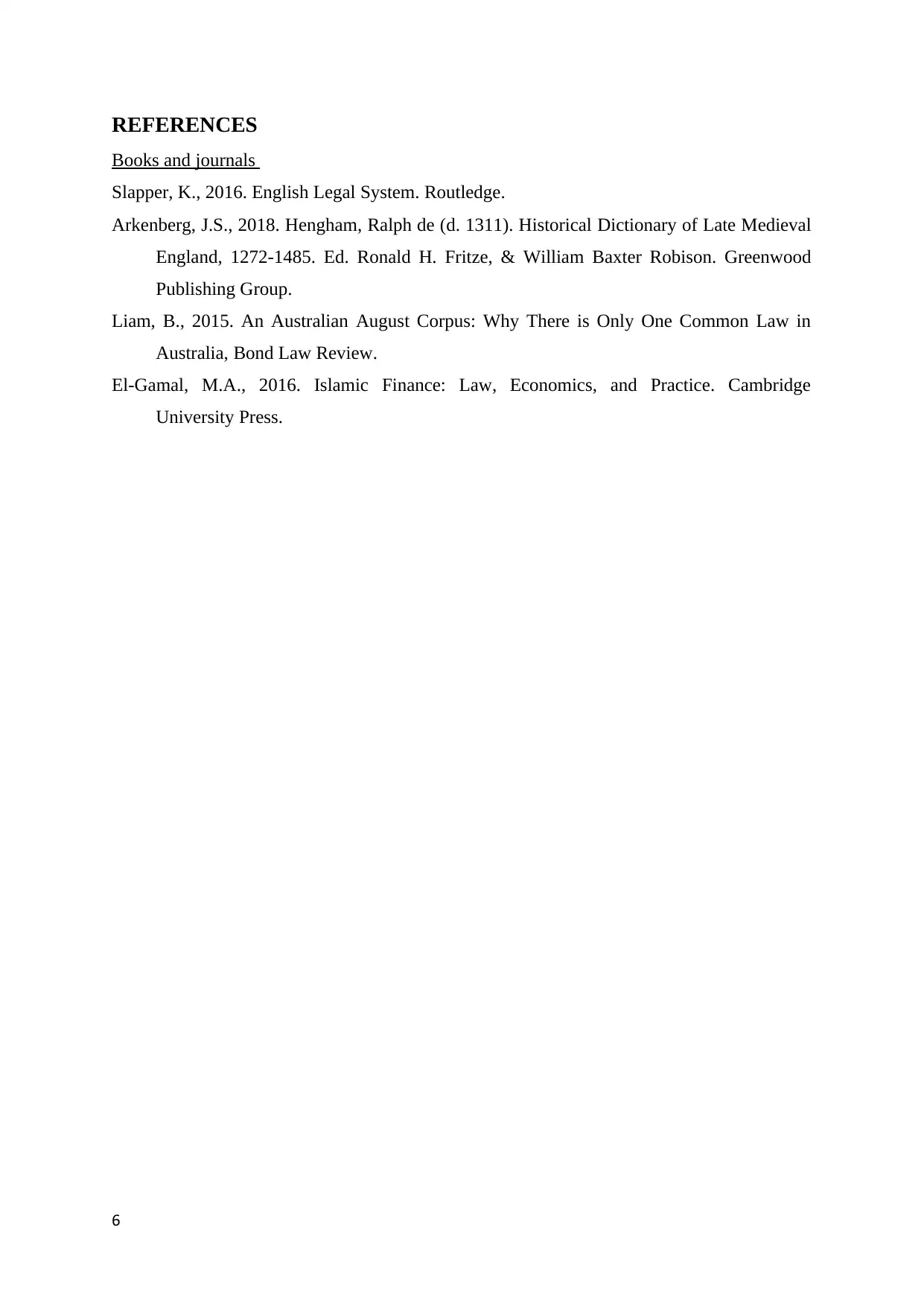
REFERENCES
Books and journals
Slapper, K., 2016. English Legal System. Routledge.
Arkenberg, J.S., 2018. Hengham, Ralph de (d. 1311). Historical Dictionary of Late Medieval
England, 1272-1485. Ed. Ronald H. Fritze, & William Baxter Robison. Greenwood
Publishing Group.
Liam, B., 2015. An Australian August Corpus: Why There is Only One Common Law in
Australia, Bond Law Review.
El-Gamal, M.A., 2016. Islamic Finance: Law, Economics, and Practice. Cambridge
University Press.
6
Books and journals
Slapper, K., 2016. English Legal System. Routledge.
Arkenberg, J.S., 2018. Hengham, Ralph de (d. 1311). Historical Dictionary of Late Medieval
England, 1272-1485. Ed. Ronald H. Fritze, & William Baxter Robison. Greenwood
Publishing Group.
Liam, B., 2015. An Australian August Corpus: Why There is Only One Common Law in
Australia, Bond Law Review.
El-Gamal, M.A., 2016. Islamic Finance: Law, Economics, and Practice. Cambridge
University Press.
6
1 out of 8
Related Documents
Your All-in-One AI-Powered Toolkit for Academic Success.
+13062052269
info@desklib.com
Available 24*7 on WhatsApp / Email
![[object Object]](/_next/static/media/star-bottom.7253800d.svg)
Unlock your academic potential
Copyright © 2020–2026 A2Z Services. All Rights Reserved. Developed and managed by ZUCOL.



